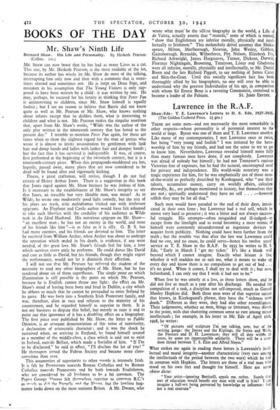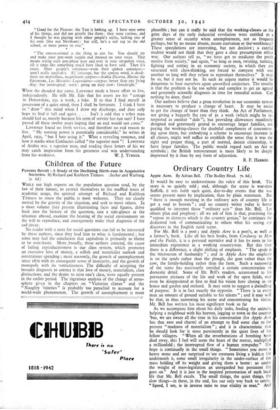Shaw-Ede : T. E. Lawrence's Letters to H. S. Ede,
1927-1935. (The Golden Cockerel Press. 21 gns.)
Lawrence in the R.A.F.
Shaw-Ede : T. E. Lawrence's Letters to H. S. Ede, 1927-1935. (The Golden Cockerel Press. 21 gns.) THERE are some men—and not necessarily the most remarkable in other respects—whose personality is of perennial interest to the world at large. Byron was one of them and T. E. Lawrence another. Like many of my contemporaries, I met Lawrence once or twice, but being "very young and foolish" I was irritated by the hero- worship of him by my friends, and had not the sense to try to get to know him. Nevertheless, Lawrence revealed himself more fully than many famous men have done, if not completely. Lawrence was afraid of nobody but himself ; he had not Termyson's curious Victorian fear of exposure, but he had the natural, uncorrupted need for privacy and independence. His world-wide notoriety was tragic experience for him, for he was emphatically not of those men- of-the-world so perfectly described by Kierkegaard, who "use their talents, accumulate money, carry on worldly affairs, calculate shrewdly, &c., are perhaps mentioned in history, but themselves they are not ; spiritually understood they have no self . . . .—however selfish they may be for all that."
Such men would have paraded to the end of their days, intoxi- cated in their own fame ; but Lawrence had a real self, which he strove very hard to preserve ; it was a bitter and not always success- ful struggle. His attempts—often misguided and ill-judged—to escape from the limelight and to avoid becoming a mere mimic of himself were commonly misunderstood as ingenious devices to acquire fresh publicity. Nothing could have been further from the truth ; but the trouble was that after the last war Lawrence cola find no one, and no cause, he could serve—hence his twelve years' service as T. E. Shaw in the R.A.F. In r935 he writes to H. S. Ede, "Early in March I 'get my ticket.' It's like a blank wall beyond which I cannot imagine. Exactly what leisure is like, whether it will madden me or suit me what it means to wake up every day and know there is no compulsion to get out of bed . it's no good. When it comes, I shall try to deal with it ; but now, beforehand, I can only say that I wish it had not to be."
When free he was utterly at a loss, as these letters show, and he did not live as much as a year after his discharge. He needed the compulsion of a task, a discipline not self-imposed, much as Gerard Manley Hopkins did. Both these men were of that superior nature that knows, in Kierkegaard's phrase, they have the "sickness unto death." Different as they were, they had also other resemblances. Their judgements, whether on men, things or literature, were direct, to the point, with that shattering common sense so rare among minor intellectuals ; for example, in his letter to Mr. Ede of April 1928, he writes:
"Of pictures and sculpture I'm not talking, now, but of the writing gangs: the joyces and the Kiplings the Steins and Wells, the Forsters and D. H. Lawrences; they ;yin all date with% 20 years, by some yet imperceptible solidarity. There will be a com- mon thread between T. S. Eliot and Alfred Noyes." - What strikes me again in reading these letters is Lawrene's intel- lectual and moral integrity—another characteristic (very rare among the intellectuals of the period between the two wars) which he had in common with Hopkins. The letters are those of a real man who stood on his own feet and thought for himself. Here are some obiter dicta:
"Your artist—ignoring Botticelli, appals me, rather. Surely that sort of education would benefit any man with stuff in him? I can imagine a half-wit being perverted by knowledge or influence: but not a real creature." "Good for the Picasso: the Tate is looking up. I have seen some of his things, and did not greatly like them: they were various, and I thought he was playing with other people's styles, lacking one of his own (like our Nevmson): but still, he's a red rag to the old school, so more power to .you."
"The conversational is the thing to aim for. You should try and make your pen-work supple and intoned on your voice. That means trying each pen-phase over and over in your unspoken voice, till it rings like something you'd have liked to have said. Then it's yours. Most pcople's sentences—even their spoken sentences— aren't really speakab'e. Ail language, bar the spoken word, is dead: there are marvellous, magnificent corpses—Arabia Deserta, Marius the Epicurean, Les Moralizes Legendaires—corpses better than any living
i
dog: but interrupted: sorry : going on duty now : Goodnight."
When the dreaded day came, Lawrence made a brave effort to live, independently. He tells Mr. Ede that his assets are his "cottage in Dorsetshire, 25s. a week, a bike. If to that I find myself in possession of a quiet mind, then I shall be fortunate. I think I have to " draw " this mind when I draw my discharge, and dare only hope to find it full and quiet. . . . Isn't it odd that a sober man should feel so, merely because his term of service has run out? I have passed all these twelve years hoping that an end would not come."
Lawrence found no fresh service, and therefore no real reason to live. "My earning power is potentially considerable," he writes in April, 1935, "but I hate using it." What a revealing sentence, and how it marks what Confucius called "the superior man "! Lawrence of Arabia was a superior man, and reading these letters of his we may catch inspiration from his greatness and win understanding



























 Previous page
Previous page